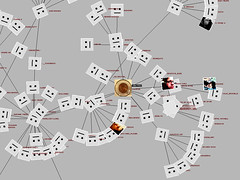
Inigral’s answer is to carry the work relationships over into the social space. If we make friends with and hang out with the people we work with, we will probably feel better about our work, try harder to please our colleagues, be less afraid to ask for help from them, etc. Other efforts that focus on embedding social networking tools directly into an academic space like an LMS may have a tougher time of it. It’s not obvious that current-generation social networking tools will transfer to direct work tasks in the way that, say, presence awareness and chat do. There’s definitely some more thinking to be done in this area.
On a related note, Inigral has posted a survey regarding how new media is being used in higher education. If you have something to contribute in this area, please go on over and participate.
“Facebook is a “place” where people hang out. They’ll go there to check out what’s happening when they have a little free time, like a dorm floor lounge or a favorite pub. This is very specifically not what people want to do with work spaces”
On the contrary, most people enjoy the spaces in work environments where they can go when they have a minute (the water cooler, the coffee machine, the desk of the receptionist who always has the latest gossip). If I can go to a similar place online, and maybe see the links my colleagues have found interesting recently, or ideas they have been tossing around, or helpful documents they have found, then so much the better. And if I can pick up on some gossip at the same time, or socialise generally, I’ll learn something about my workplace or colleagues which may well help us work together better in the future.
It’s possible that such a “water cooler” experience can be created through academic social networking. I find Twitter more conducive to that sort of behavior than Facebook, but that may just be social context. We’ll see. I think a lot of this stuff has yet to prove out.
In any event, while I grant that there are social-ish work spaces, they are qualitatively different. You may go to hang out there as a break during work hours, but would you go there on off hours?
Hi Laura,
The “water cooler” effect is precisely what we’re going for at Inigral. The point is that Facebook users have intentions when they log into Facebook, and any actions or strategies adopted by institutions in education needs to stay consistent with them.
All the Best,
Michael Staton
There are other distinctions that might be drawn. Just thinking out loud here, but there is a breed of social-networking apps whose focus is on the content and not the people (think YouTube or Flickr rather than Facebook). The content is primary, the relations that spring up around the content secondary. I sometimes wonder if academic networking might not be similar in a majority of cases.
Good point, Clay. Which is one reason why I find brainify intriguing.